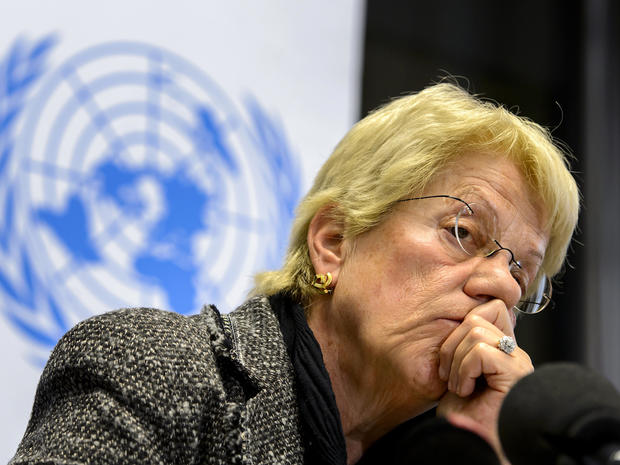U.N.: Both sides in Syria guilty of war crimes
BEIRUT A U.N.-appointed panel said Monday that the civil war is becoming more sectarian and that both sides are becoming increasingly radicalized.
The panel's 131-page report, released Monday, said regime forces and affiliated militias committed crimes against humanity such as murder, torture and rape. It said anti-government armed groups have committed war crimes, including murder, torture and hostage-taking, but said these did not reach the "intensity and scale" of the government's violations.
"We were able to identify high level perpetrators and we will indicate that in a list that will remain sealed, because what we need is a tribunal, taking care, conducting a formal investigation and be able to issue and indictment against such perpetrators," U.N. investigator and former chief prosecutor of the International Criminal Court, Carla Del Ponte, told reporters at a news briefing in Geneva, according to CBS Radio.
Del Ponte said the investigators were following the chain of command in Syria to establish responsibility of "high political and military suspects."
Del Ponte said it is "time to react" for the Security Council and to refer war crimes in Syria to the International Criminal Court (ICC) for prosecution, adding that it's "incredible" that the Security Council has not take action yet.
CBS News foreign affairs analyst Pamela Falk says that while the panel's report adds to the chorus of calls for the Security Council to refer the case of Syria's human rights violations to the ICC, the Council remains unable to act because Russia and China continue to wield their veto power to block any such move.
The U.N. says nearly 70,000 people have been killed in Syria's conflict since the revolt against Assad began in March 2011.
The U.N. report said the only way to end Syria's crisis is a political solution between the two sides.
- Israel says it aided wounded Syrians
- Syria rife with reports of sectarian kidnappings
- Video: Syria's youngest talk about life in war zone
Also Monday, European Union foreign ministers said they are keeping the current sanctions against Syria in place for three months, blocking a push by some to ease restrictions so some countries could arm the rebels.
An EU official said before the meeting in Brussels that Britain was pushing to ease the embargo, but several foreign ministers from other countries said they opposed the move.
Since the opposition began taking up arms against Assad's forces in late 2011, it has pleaded for military aid, calling it the only way to turn the tide against Assad's forces.
The U.S. and other countries have resisted such a move, saying there is no way to control how the arms are used, especially with Islamic radicals rising in the rebel ranks.
Meanwhile, inside Syria, rebels captured a government checkpoint on the main road to the country's second-largest airport Monday as opposition fighters pressed their campaign to capture the strategic facility in the northern city of Aleppo, activists said.
The rebels launched a major attack on the airport and the adjacent Nairab military airfield last week, and have since overrun the main army base protecting the area. Control of the airport would provide a significant boost for the opposition, and mark a strategic shift in the country's 23-month civil war.
The fighting has been raging for weeks, but it was only in early February after the rebels captured the strategic Aleppo neighborhood of Sheik Said near the airport, which has been shut down because of the violence, that the offensive gained momentum.
The Britain-based Syrian Observatory for Human Rights and the Aleppo Media Center reported that rebels captured the main fuel station on the Nairab base. The Observatory said there were several regime casualties and five rebels, including foreign fighters, killed.
The fight for the international airport in Aleppo, Syria's largest city and commercial hub, highlights the importance that both sides in the conflict place on controlling strategic assets that could provide an edge in the larger fight for the country.
